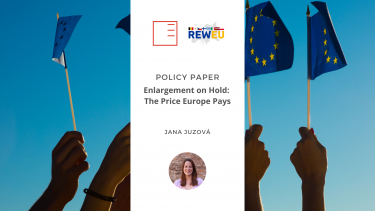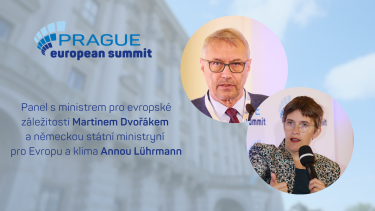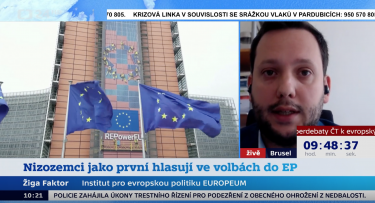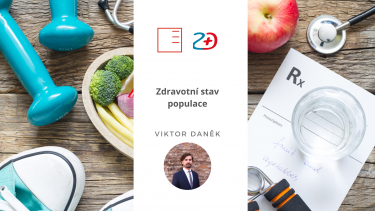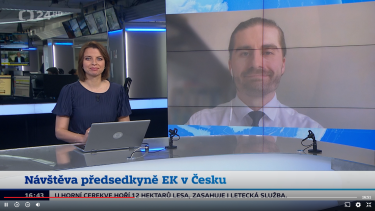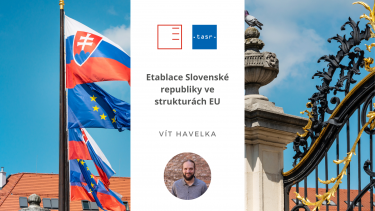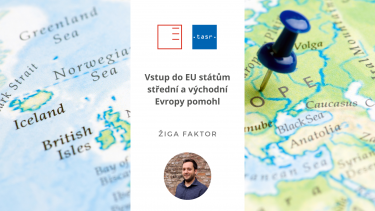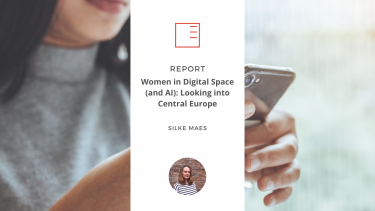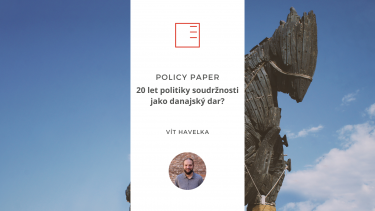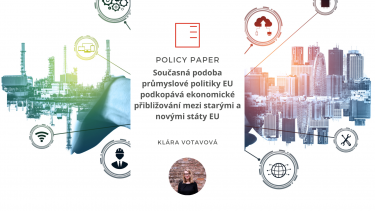Policy Paper | Enlargement on Hold: The Price Europe Pays
How can the EU enlargement process regain its lost momentum? And how can we learn from previous rounds of enlargement? These questions are answered by a group of authors together with EUROPEUM Institute senior researcher Jana Juzová in a new publication within the REWEU project.
Zjistit vícePES 2024 | The EU must cooperate not only militarily, but also to defend itself against cyber attacks from Russia, said Minister Dvořák at the conference
The second day of the Prague European Summit 2024 conference at the Czernin Palace was opened with a speech by Czech Minister for European Affairs Martin Dvořák. He thinks of the enlargement of the European Union as crucial. "We have to realize that the enlargement of the EU, our defense and security and the current Central European position are interconnected," he said.
Zjistit víceČT24 | European Parliament elections begin
Do the elections across European countries have a common theme? If far-right parties succeed, can they unite? How can the problem of long-term low voter turnout in European elections be explained? Is this trend only in Central Europe? Can candidates for the European Parliament really deliver on what they promise? What happens immediately after the elections? Žiga Faktor, Deputy Director and Head of the Brussels Office of EUROPEUM Institute, answered these and other questions.
Zjistit více
Zdravotnický deník | Population Health
Politicians and companies should start putting more emphasis on prevention and education about active and healthy lifestyles, because the health of the population has a major impact on the competitiveness of companies and the national economy. Viktor Daněk, Deputy Director of EUROPEUM Institute, commented on this issue.
Zjistit víceČT24 | Visit of the European Commission President to the Czech Republic
European Commission President Ursula von der Leyen arrived in the Czech Republic. She met with President Petr Pavel and Prime Minister Petr Fiala. The visit was part of the campaign ahead of the European Parliament elections in June. Viktor Daněk, Deputy Director of EUROPEUM Institute, commented on Ursula von der Leyen's arrival in the Czech Republic.
Zjistit víceTASR | Establishment of the Slovak Republic in the EU structures
Twenty years ago, the European Union underwent its biggest enlargement with the addition of ten Central and Eastern European countries. According to Vít Havelka, Senior Research Fellow at EUROPEUM Institute, this is enough time for all accession countries to learn how to navigate the EU institutions and its decision-making process.
Zjistit více
TASR | EU accession helped Central and Eastern European countries
In 2004, a total of ten new countries joined the European Union, the largest enlargement in terms of population and number of countries. EU accession has helped the countries of Central and Eastern Europe, especially in terms of economic growth and political stabilisation. Žiga Faktor, Deputy Director of EUROPEUM Institute and Head of the Brussels Office, commented on this topic.
Zjistit více
Report | Women in Digital Space (and AI): Looking into Central Europe: cases from Austria, Czechia, Poland and Slovakia
Our researcher Silke Maes in her latest report addresses issues of cyberviolence on women and examines whether women in the CEE benefit from digitalisation (and AI). The report looks into how women use and contribute to the digital space, examines opportunities and challenges and proposes recommendations for a more inclusive digital space.
Zjistit vícePolicy Paper | 20 years of cohesion policy as a "Beware of Greeks bearing gifts"?
It has been 20 years since the Czech Republic and 9 other Central, Southern and Eastern European countries joined the European Union. This was on the promise of increased prosperity and the so-called economic catching-up of the post-communist part of Europe. Cohesion policy was to play a key role here. Vít Havelka writes in his Policy Paper.
Zjistit více
Policy paper | Current EU industrial policy undermines economic convergence between old and new EU countries
The post-communist states of Central and Eastern Europe, including the Czech Republic, joined the European Union at the height of globalisation and the dominance of the so-called Washington Consensus policies. However, the global economic crisis of 2008 showed shortly afterwards that these policies had their limits. Read more in Klára Votavová's Policy Pepeu.
Zjistit víceStaroměstské náměstí 4/1
Praha 1 - Staré Město
110 00
tel.: +420 212 246 552
email: europeum@europeum.org
https://www.europeum.org
